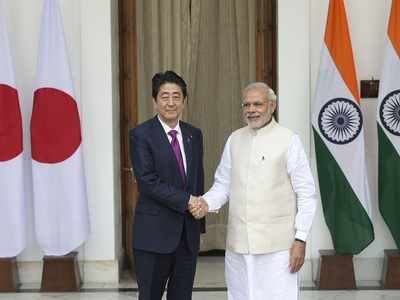
In what PM Narendra Modi and his outgoing counterpart Shinzo Abe described as a development that will augment peace and security in the Indo-Pacific, India and Japan signed the much anticipated Agreement on Reciprocal Provision of Supplies and Services between the Indian Armed Forces and the Self-Defense Forces of Japan.
Also known as ACSA (Acquisition and Cross-Servicing Agreement), the agreement is expected to facilitate "smooth and prompt" provision of supplies, and promote closer cooperation between the armed forces of India and Japan, two countries embroiled in boundary disputes with an increasingly aggressive China.
ACSA, among other things, will facilitate visits of ships or aircraft of the forces of either country to facilities in the territory of the other country. The agreement was followed by, as Japan described it, a summit phone talk between Modi and Abe.
The 2 leaders agreed ACSA will deepen defence cooperation between the 2 countries even as speculation mounts about how Abe's exit could impact Japan's Free and Open Indo-Pacific strategy that merged seamlessly with India's own Act East Policy.
Both leaders expressed confidence though that the India-Japan partnership will continue "unabated".
Modi and Abe got along famously, not least because of their mutual annual summits. ACSA actually was supposed to be signed in a physical summit this year but that was put paid to by Abe's sudden decision to resign because of health reasons and Covid-19. The 2019 summit also couldn't take place because of anti-CAA protests in Assam.
Abe started his conversation with Modi Thursday by explaining why he was resigning and expressed his gratitude for the friendship and the "relationship of trust" built with Modi. Modi also thanked Abe for taking the bilateral relationship to another level and invited him and his wife to visit India at leisure. They recalled their recalled their meetings in Varanasi, Sabarmati , Kobe and Kyoto and also Modi's visit to Abe’s ancestral home in Yamanashi.
"Both Prime Ministers affirmed that the basic policy of Japan-India-emphasis remains unchanged, and concurred with each other that the two countries continue to work closely in such areas as security, economy, and economic cooperation including the high-speed rail project," said the Japanese foreign ministry in a statement.
The leaders reviewed the status of ongoing bilateral cooperation, including the Mumbai-Ahmedabad High Speed Rail (MAHSR) project, under the framework of the India-Japan Special Strategic and Global Partnership.
"They agreed that the strong and enduring partnership between the two countries will play a critical role in charting the course for the global community in the post-COVID world," said MEA in a statement.
Japan, in fact, is one country which has been keen to move ahead with projects in India even as Covid-19 cases spike here.
Modi and Abe also expressed appreciation for the support provided to resident citizens in each other’s countries during the pandemic and agreed that such efforts must be continued to sustain the strong people-to-people ties between the two countries, said the Indian government.
Modi conveyed his intention to work closely with the new government of Japan and wished Abe the very best for the future, according to MEA.
Also known as ACSA (Acquisition and Cross-Servicing Agreement), the agreement is expected to facilitate "smooth and prompt" provision of supplies, and promote closer cooperation between the armed forces of India and Japan, two countries embroiled in boundary disputes with an increasingly aggressive China.
ACSA, among other things, will facilitate visits of ships or aircraft of the forces of either country to facilities in the territory of the other country. The agreement was followed by, as Japan described it, a summit phone talk between Modi and Abe.
The 2 leaders agreed ACSA will deepen defence cooperation between the 2 countries even as speculation mounts about how Abe's exit could impact Japan's Free and Open Indo-Pacific strategy that merged seamlessly with India's own Act East Policy.
Both leaders expressed confidence though that the India-Japan partnership will continue "unabated".
Modi and Abe got along famously, not least because of their mutual annual summits. ACSA actually was supposed to be signed in a physical summit this year but that was put paid to by Abe's sudden decision to resign because of health reasons and Covid-19. The 2019 summit also couldn't take place because of anti-CAA protests in Assam.
Abe started his conversation with Modi Thursday by explaining why he was resigning and expressed his gratitude for the friendship and the "relationship of trust" built with Modi. Modi also thanked Abe for taking the bilateral relationship to another level and invited him and his wife to visit India at leisure. They recalled their recalled their meetings in Varanasi, Sabarmati , Kobe and Kyoto and also Modi's visit to Abe’s ancestral home in Yamanashi.
"Both Prime Ministers affirmed that the basic policy of Japan-India-emphasis remains unchanged, and concurred with each other that the two countries continue to work closely in such areas as security, economy, and economic cooperation including the high-speed rail project," said the Japanese foreign ministry in a statement.
The leaders reviewed the status of ongoing bilateral cooperation, including the Mumbai-Ahmedabad High Speed Rail (MAHSR) project, under the framework of the India-Japan Special Strategic and Global Partnership.
"They agreed that the strong and enduring partnership between the two countries will play a critical role in charting the course for the global community in the post-COVID world," said MEA in a statement.
Japan, in fact, is one country which has been keen to move ahead with projects in India even as Covid-19 cases spike here.
Modi and Abe also expressed appreciation for the support provided to resident citizens in each other’s countries during the pandemic and agreed that such efforts must be continued to sustain the strong people-to-people ties between the two countries, said the Indian government.
Modi conveyed his intention to work closely with the new government of Japan and wished Abe the very best for the future, according to MEA.
Download
The Times of India News App for Latest India News

Coronavirus outbreak
Trending Topics
LATEST VIDEOS
India
 India-China border tension: Govt failed to rescue 5 missing youth, says Adhir Ranjan Chowdhury
India-China border tension: Govt failed to rescue 5 missing youth, says Adhir Ranjan Chowdhury  NSA Ajit Doval meets French minister Florence Parly
NSA Ajit Doval meets French minister Florence Parly 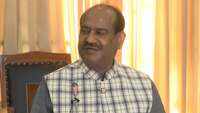 Lok Sabha speaker Om Birla briefs about seating arrangements in Parliament ahead of Monsoon Session
Lok Sabha speaker Om Birla briefs about seating arrangements in Parliament ahead of Monsoon Session 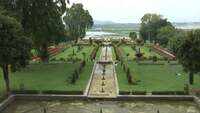 J&K: Mughal gardens to be included in UNESCO world heritage sites
J&K: Mughal gardens to be included in UNESCO world heritage sites 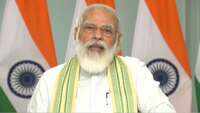 Over Rs 20,000 crore will be spent on ‘Pradhan Mantri Matsya Sampada Yojana’: PM Narendra Modi
Over Rs 20,000 crore will be spent on ‘Pradhan Mantri Matsya Sampada Yojana’: PM Narendra Modi 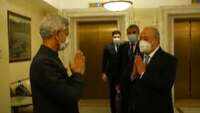 External Affairs Minister S Jaishankar meets his Uzbek and Kazakh counterparts in Moscow
External Affairs Minister S Jaishankar meets his Uzbek and Kazakh counterparts in Moscow
More from TOI
Navbharat Times
Featured Today in Travel
Quick Links
Coronavirus in MumbaiCoronavirus in KolkataCoronavirus in HyderabadCoronavirus in DelhiCoronavirus in BangaloreCoronavirus symptomsCoronavirus in IndiaWhat is CoronavirusCoronavirus NewsSolar EclipseNPRWhat is NRCCAB BillCAB and NRCRTI BillPodcast newsLok SabhaShiv SenaYSRCPCongressBJP newsUIDAIIndian ArmyISRO newsSupreme Court
Get the app



